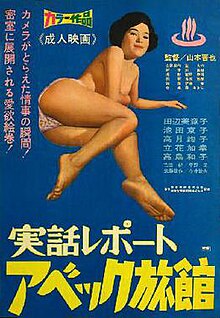Love Hotel (1968 film)
| Love Hotel | |
|---|---|
 Theatrical poster for Love Hotel (1968) | |
| Directed by | Shin'ya Yamamoto[1] |
Production company | Tōkyō Kōei |
| Distributed by | Shintōhō Eiga |
Release date | September 1968 |
Running time | 71 minutes |
| Country | Japan |
| Language | Japanese |
Love Hotel (アベック旅館, Avec Ryokan) aka Jitsuwa Repōto: Avec Ryojō (実話レポート アベック旅情)[1] and A Rendezvous Hotel[2] is a 1968 Japanese pink film directed by Shin'ya Yamamoto.
Synopsis[edit]
When a prostitute at a love hotel passes out drunk, the voluptuous madam who owns the establishment must serve in her place.[3]
Cast[edit]
- Mieko Tanabe as Toyoko[4]
- Kako Tachibana as Rumi
- Akiko Kozuki as Rinko
- Kyoko Ikeda as Hiromi
- Jun Yoshida
Background[edit]
Director Shin'ya Yamamoto is known as one of the "Founding Fathers" of the pink film.[5] In his Behind the Pink Curtain: The Complete History of Japanese Sex Cinema, Jasper Sharp credits Yamamoto with almost single-handedly injecting the element of light-hearted fun into pink cinema.[6] His earliest films were in the serious and often misogynistic tone of many pink films of the era. Critics judged such early Yamamoto films as Degenerate (1967), Torture by a Woman (1967), and The Rapist (1968) to be technically superior to much of the pink product of the time, but not distinguished from them in terms of theme or style.[7]
Yamamoto filmed Love Hotel for Tōkyō Kōei and it was released theatrically in Japan by Shintōhō Eiga in September 1968.[1] With this film, Yamamoto found the style which would make him one of the most popular pink film directors for the next decade.[7] His films of this period, such as the 15-film Widow's Boarding House series and his "Women's Onsen" films, are known for an interest in people living in group settings, and for a light, comical touch which was in direct contrast to most contemporary pink cinema, which tended to be darker in subject-matter.[8][9] Even more so than the Widow's Boarding House scenario, which has been taken up by other directors, Yamamoto's Molester's Train series, which he started in 1975, has proven a prolific series of pink comedies. Academy Award-winning director Yōjirō Takita made the series his own in the 1980s, and Molester's Train films were still being made in the new millennium.[9]
Bibliography[edit]
English[edit]
- Avec riyokan (1968) at IMDb
- "AVEC RIYOKAN". Complete Index to World Film. Retrieved 2010-04-12.
- Weisser, Thomas; Yuko Mihara Weisser (1998). Japanese Cinema Encyclopedia: The Sex Films. Miami: Vital Books : Asian Cult Cinema Publications. pp. 251–252. ISBN 1-889288-52-7.
Japanese[edit]
- 実話レポート アベック旅情 (in Japanese). Japanese Movie Database. Retrieved 2010-04-12.
- アベック旅館 (in Japanese). Japanese Cinema Database (Agency for Cultural Affairs). Retrieved 2010-04-12.
Notes[edit]
- ^ a b c 実話レポート アベック旅情 (in Japanese). Japanese Movie Database. Retrieved 2010-04-12.
- ^ "AVEC RIYOKAN". Complete Index to World Film. Retrieved 2010-04-12.
- ^ Weisser, Thomas; Yuko Mihara Weisser (1998). Japanese Cinema Encyclopedia: The Sex Films. Miami: Vital Books : Asian Cult Cinema Publications. pp. 251–252. ISBN 1-889288-52-7.
- ^ Cowie, Peter, ed. (1977). "Japan". World Filmography 1968. London: Tantivy Press. p. 357. ISBN 0-904208-36-2.
- ^ Weisser, p. 504.
- ^ Sharp, Jasper (2008). Behind the Pink Curtain: The Complete History of Japanese Sex Cinema. Guildford: FAB Press. p. 65. ISBN 978-1-903254-54-7.
- ^ a b Weisser, p. 110.
- ^ Weisser, pp. 110, 251-252, 504.
- ^ a b Sharp, p. 66.
